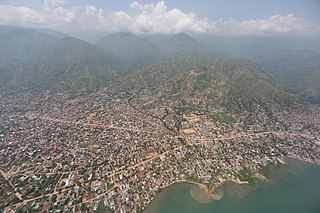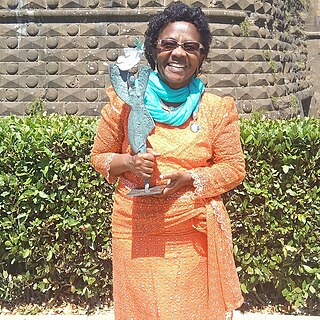
South Kivu is one of 26 provinces of the Democratic Republic of the Congo (DRC). Its capital is Bukavu.

Bukavu is a city in eastern Democratic Republic of the Congo (DRC), lying at the extreme south-western edge of Lake Kivu, west of Cyangugu in Rwanda, and separated from it by the outlet of the Ruzizi River. It is the capital of the South Kivu Province and as of 2012 it had an estimated population of 806,940.

Uvira is the capital city of the Uvira Territory in the South Kivu Province of the Democratic Republic of the Congo (DRC). It is situated between Lake Tanganyika and the Mitumba Mountains and covers an area of approximately 16km.
Panzi Hospital in Bukavu, the capital of the Sud-Kivu province in the Democratic Republic of the Congo. It specializes in treating survivors of violence, the large majority of whom have been sexually abused. After years of military rape in South Kivu, there is increased civilian adoption of sexual violence.
Social Aid For the Elimination of Rape (SAFER) is a Canadian humanitarian-aid non-governmental organization that was formed in 2004.

The Kivu conflict is an umbrella term for a series of protracted armed conflicts in the North Kivu and South Kivu provinces in the eastern Democratic Republic of the Congo which have occurred since the end of the Second Congo War. Including neighboring Ituri province, there are more than 120 different armed groups active in the eastern Democratic Republic of Congo. Currently, some of the most active rebel groups include the Allied Democratic Forces, the Cooperative for the Development of the Congo, the March 23 Movement, and many local Mai Mai militias. In addition to rebel groups and the governmental FARDC troops, a number of national and international organizations have intervened militarily in the conflict, including the United Nations force known as MONUSCO, and an East African Community regional force.

Denis Mukwege is a Congolese gynecologist and Pentecostal pastor. He founded and works in Panzi Hospital in Bukavu, where he specializes in the treatment of women who have been raped by armed rebels. In 2018, Mukwege and Iraqi Yazidi human rights activist Nadia Murad were jointly awarded the Nobel Peace Prize for "their efforts to end the use of sexual violence as a weapon of war and armed conflict".

The Democratic Republic of the Congo, and the east of the country in particular, has been described as the "Rape Capital of the World", and the prevalence and intensity of all forms of sexual violence has been described as the worst in the world. Human Rights Watch defines sexual violence as "an act of a sexual nature by force, or by threat of force or coercion", and rape as "a form of sexual violence during which the body of a person is invaded, resulting in penetration, however slight, of any part of the body of the victim, with a sexual organ, or of the anal or genital opening of the victim with any object or other part of the body."
The Democratic Republic of the Congo (DRC) is a source and destination country for men, women, and children subjected to trafficking in persons, specifically conditions of forced labor and forced prostitution. The majority of this trafficking is internal, and much of it is perpetrated by armed groups and government forces outside government control within the DRC's unstable eastern provinces.

Bunyakiri is a town located in the high plateau of Kalehe Territory in the South Kivu Province in the eastern region of the Democratic Republic of the Congo (DRC). Bunyakiri is nearby the Bulehe and Mulamba villages. It is mainly inhabited by Tembo, Havu, Twa and Hunde ethnic groups.

Minova is a town in the Kalehe Territory, Democratic Republic of the Congo. It is an important business center for farm-fishery products. It is very close to Idjwi Island, Masisi Territory, Lake Kivu on its North Western shore and is only 45 km from the Goma city. The town's development is linked with important refugee-related history, including those from Rwanda in 1994, those from Masisi in 1992–1997, and other surrounding areas in northern South Kivu Province, Democratic Republic of the Congo. It is known for being the site of the systematic rape of refugees by DRC troops. WE actually find many local organisations involved in the management of Gender Based Violence (GBV) working tirelessly to restore dignity to women and girls who were raped( Panzi Foundation DRC is one of them, and it is very active in Buzi -Bulenga area).

Luvungi, also known as Itara-Luvungi, is one of the groupements (groupings) within the Bafuliiru Chiefdom in the Uvira Territory of the South Kivu Province in the eastern Democratic Republic of the Congo (DRC). Situated on the Ruzizi Plain, it lies at the borders of Uvira Territory and Walungu Territory, in close proximity to the frontiers of Rwanda and Burundi. Luvungi is home to a population of approximately 85,000 individuals, predominantly consisting of Fuliru agriculturalists who play a vital role in the local community. There's also has a small population of Vira, Bembe, Lega, Shi, Burundians and Banyamulenge. Its economy is founded mainly on subsistence agriculture and the artisanal mining of cassiterite, an ore of tin.
The Land Forces, also called the Congolese Army, are the land warfare component and the largest branch of the Armed Forces of the Democratic Republic of the Congo (FARDC).
Bestine Kazadi Ditabala,, is a Congolese writer.
Nelly Mbangu is a Congolese women's and children's rights campaigner. She has been involved in many non-governmental organisations in this field and co-founded a movement to bring together 30 organisations with similar aims. She is a woman human rights defender and the coordinator of the Help and Action for Piece - Aide et Action pour la Paix (AAP). Additionally Help and Action for Piece - Aide et Action pour la Paix (AAP) works on good governance topics, conflict resolution of land rights disputes. Those issues often affect women, for this reason Help and Action for piece links these topics together to positively impact the human rights situation in locally.

Katana Gégé Bukuru is a Congolese activist fighting for women rights. She is also the founder of the SOFAD.
Douce Namwezi N'Ibamba is a journalist, radio producer and social entrepreneur from the Democratic Republic of the Congo (DRC), who empowers women through education and training, with a particular emphasis on gender equality and menstrual hygiene. She is also the president of the board of the cultural space called, Espace Culturel Kwetu Art.
Nothing Without Women is a feminist organization established in the Democratic Republic of the Congo in 2015.
Fabiola Faïda Mwangilwa is a politician and women's rights activist in the Democratic Republic of the Congo. She is a former Minister of Family and Women's Affairs, and a founding member of several women's organizations and platforms.
The Network of Women for Rights and Peace is a women's rights organization in the Democratic Republic of the Congo. Founded in 1999, it gives judicial support to victims of sexual violence, raises awareness about human rights and democracy, and works to increase women's literacy through a network of grassroots organizations, the Comités d’Alerte pour la Paix (CAP).









